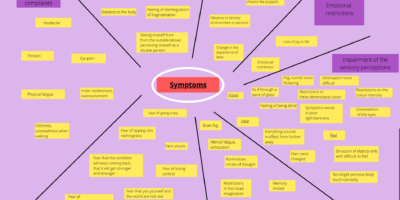Depersonalization and derealization: psychotherapy is effective
Some people are affected by depersonalization or derealization in a way that is very life-threatening. Professional treatment of the symptoms is then advisable.
As medication is not approved for the treatment of depersonalization and derealization, psychotherapy is the method of choice.
Psychotherapy
Psychotherapy is a scientifically based method for the treatment of mental illnesses and disorders. It addresses the subjective impairment of the person affected and attempts to help improve the situation through various attitudes, approaches and methods.
For many illnesses, psychotherapy is at least as effective or even more effective than medication.
Psychotherapy for depersonalization and derealization
Psychotherapy for the treatment of depersonalization and derealization follows a structured process.
1. Anamnesis
In the anamnesis, the type of impairment the affected person suffers from is determined.
What are the triggers? What maintaining factors? Which areas of life are difficult?
2. Planning the therapy
The therapy is planned on the basis of previously defined therapy content and goals.
What does the person want to achieve? What is realistic? How can the goals be achieved (strategies and methods)?
3. Better explore one’s own symptoms
Depersonalization and derealization are always different and individual for those affected. It is important to know your own symptoms well in order to be able to deal with them appropriately.
How did the symptoms develop in my case? What do the symptoms look like in detail? What scares me about it?
4. Symptom reduction
In this area, the affected person learns various ways to reduce the symptoms. The focus is always on the question of what the person can do to participate in life as much as possible despite the symptoms.
Where am I restricted by the symptoms? What can I do to reduce the symptoms? What tools and strategies can I use myself (–>self-help for DP/DR)?
5. Improving the quality of life
Most people affected by chronic depersonalization or derealization have a very low quality of life. Psychotherapy works specifically on finding meaning in life again.
What could give my life meaning? How can I achieve this and what do I need to do so?
6. Relapse prevention
Feelings of unreality and alienation are part of the normal spectrum of human experience. Therefore, such feelings can occur again and again in certain situations. For this reason, it is important to know how to deal with challenging situations without resorting to depersonalization or derealization as a mechanism.
Which situations are particularly challenging for me? How can I deal with stress better?
7. Recording therapy successes
Success in psychotherapy often comes slowly and over time. For many of those affected, this is not fast enough or they even overlook successes because they are so small. It is therefore important to record and discuss them during therapy.
What successes have already been achieved? How can I ensure that further successes occur?
By going through these 7 steps, in most cases a significant reduction in symptoms or even the disappearance of symptoms can be achieved.
If you need support, please contact us.

Schreibe eine Antwort